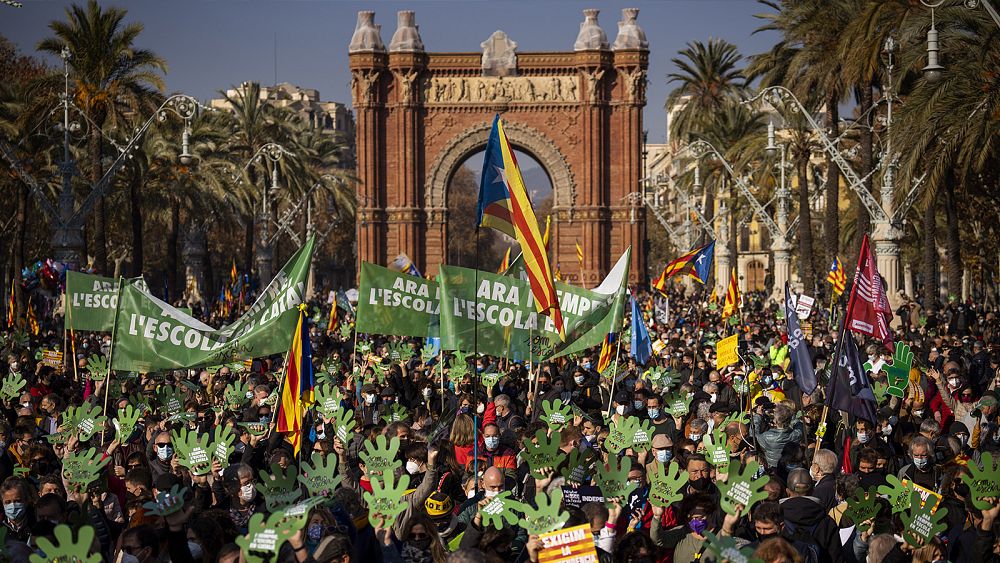
A court decision that mandates that 25 per cent of all school subjects be taught in Spanish sparked protests in Barcelona on Saturday.
Protesters claim this would weaken the existing educational system which has helped bring Catalan back to common use after it had been suppressed during the 20th-century dictatorship of general Francisco Franco, despite the still predominant use of the local Catalan language in classrooms.
“It is not proper of a democracy that a court invalidates an educational system that is supported by society and its parliament,” said Òscar Escuder, president of Platform for the Language, a grassroots group that promotes the use of Catalan who joined the march.
The protests in defence of the Catalan language might also galvanize the region’s separatist movement.
Several marchers carried pro-independence flags, and the movement’s leaders were in attendance.
The Spanish Constitution states that Spanish is the language of the nation and should be learned and spoken by everyone.
It also states that Catalan and other minority languages like Basque are co-official languages and part of Spain’s “cultural patrimony that should be subject to special respect and protection.”
Catalan and Spanish are mutually intelligible to the point where conversations can easily flow from one language to the other, especially since the languages share a similar vocabulary.
The vast majority of Catalonia’s 7.7 million residents speak both Catalan and Spanish fluently.
The use of languages in Catalonia’s schools has become a heated national debate after a family denounced that they had been insulted and felt threatened following their request for their child’s public school in Canet de Mar just north of Barcelona to increase the hours of Spanish as mandated by the courts.
“We aren’t against Catalan. We love Catalan, and we appreciate the richness it gives us all as individuals and as a society,” the family said in an open letter, written in Spanish and Catalan.
“But we are bilingual, and we also love Spanish. Our goal is nothing more than for Spanish to form a part of our child’s education in a normal way just as it does in Catalan society.”
Language as a political issue
The march comes less than a month since Spain’s Supreme Court upheld the 2020 decision by a lower court in Catalonia that ruled in favour of a suit brought by Spain’s previous conservative government of Partido Popular’s Mariano Rajoy against Catalonia’s Department of Education.
The Supreme Court tossed out an appeal by the Catalan government against the previous ruling that the region’s schools must guarantee at least 25 per cent of academic subjects are taught in Spanish.
That would translate into roughly doubling the hours students are taught in Spanish. Currently, most schools only use Spanish in Spanish language class, leaving everything else to be taught in Catalan.
The increase may seem slight, but for many Catalans it is sacrilege.
“I am here to defend the educational system in which I was schooled, and my children were schooled,” said Mónica Muñoz, a 47-year-old translator and mother of three.
“[The court mandate] is the death of our language. Our language is the foundation of our society, and it has been shown that the educational system works,” Muñoz stated.
The Assembly for a Bilingual School in Catalonia, a grassroots group representing Catalans who want more Spanish in classrooms, says that while around 100 families have taken their demand for more Spanish to the courts, there are “many more” who support them.
But now another institutional showdown looms between central authorities ruled by Pedro Sánchez and his socialist PSOE-led government and the Catalan regional one, which is run by secessionists who are vowing not to abide by the requirement to increase Spanish in schools.
The use of Catalan in schools was officially prohibited during Franco’s rule from the end of the 1936-1939 Spanish Civil War until his death in 1975.
Since then, the promotion of the language has been a prized achievement of Catalonia, which enjoys a wide degree of self-rule since Spain’s return to democracy.